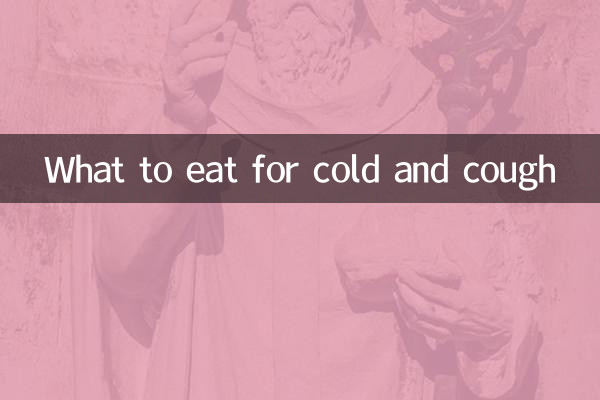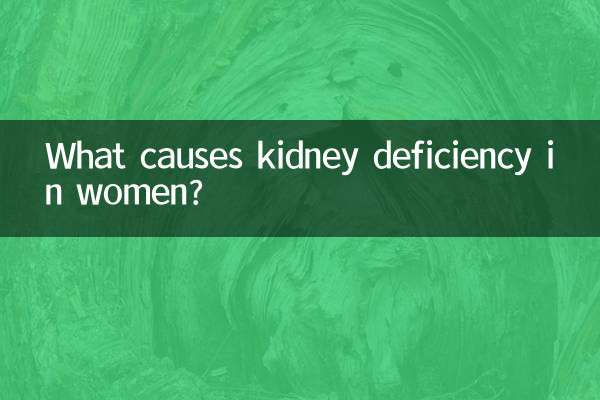What to eat for cold and cough
Colds and coughs are common respiratory diseases, which are more likely to occur when seasons change or temperatures change greatly. A proper diet can not only relieve symptoms but also speed recovery. The following is a compilation of dietary recommendations for colds and coughs that have been hotly discussed across the Internet in the past 10 days. It combines scientific evidence and folk experience to provide you with practical reference.
1. Recommended foods during cold and cough

The following are the 10 most discussed foods on the Internet to relieve colds and coughs and their effects:
| food name | Main functions | Recommended way to eat |
|---|---|---|
| honey | Soothes throat and relieves cough, antibacterial and anti-inflammatory | Take with warm water or with lemon |
| ginger | Warm up the cold and relieve nasal congestion | Make ginger tea or add to dishes |
| white radish | Resolves phlegm, relieves cough, and promotes digestion | Simmer or juice |
| pear | Clear away heat and moisturize the lungs, produce body fluids and quench thirst | Stewed pears with rock sugar or eat them directly |
| garlic | Antibacterial, anti-inflammatory, enhance immunity | Eat raw or cook porridge |
| Lily | Moisten the lungs, relieve cough, soothe the nerves and promote sleep | Cook porridge or stew |
| Tremella | Nourishes yin and moisturizes the lungs, relieves dry cough | Stewed white fungus with rock sugar |
| chicken soup | Supplement nutrition and relieve inflammation | Light stew |
| citrus fruits | Supplement vitamin C to enhance immunity | Eat directly or juice |
| onion | Sterilize and reduce inflammation, relieve cough | Stir-fry or soup |
2. Diet taboos during cold and cough
In addition to knowing what to eat, it is equally important to know what foods to avoid. The following are the foods to avoid during cold and cough that have been discussed most recently by netizens:
| food category | unsuitable reason | Alternative suggestions |
|---|---|---|
| spicy food | Irritating the throat and aggravating cough | Choose a lighter flavor |
| Fried food | Increase sputum secretion | Switch to steaming method |
| cold drink | aggravate respiratory symptoms | Drink warm water or hot drinks |
| Sweet food | Promote phlegm production | Choose naturally sweet foods |
| alcohol | suppress immune system | Drink more warm water or herbal tea |
3. Dietary remedies for colds and coughs that are hotly discussed on the Internet
Recently, on major social platforms and health apps, the following dietary remedies have been the most discussed:
| Diet name | Main materials | Preparation method |
|---|---|---|
| Rock sugar snow pear | Sydney, rock sugar, Sichuan clams (optional) | Pear cored and stewed with rock sugar |
| Green onion and white ginger syrup | Onion, ginger, brown sugar | Boil the ingredients in water for 10 minutes |
| honey lemonade | honey, lemon, warm water | Lemon slices and honey |
| Carrot honey drink | White radish, honey | Juice radish and mix with honey |
| Lily Tremella Soup | Lily, white fungus, rock sugar | Stew the ingredients until soft |
4. Dietary recommendations for different types of colds
According to the theory of traditional Chinese medicine, colds are divided into wind-cold type and wind-heat type, and the dietary regimen should also be different:
| cold type | Main symptoms | Recommended food | avoid food |
|---|---|---|---|
| Cold and cold | Afraid of cold, clear nose, white phlegm | Ginger, scallions, garlic | Cool foods such as watermelon |
| Anemopyretic cold | Fever, yellow phlegm, sore throat | Pear, chrysanthemum, honeysuckle | Spicy and warming foods |
5. Special dietary recommendations for children with colds and coughs
In recent parenting forums, there has been particularly heated discussion about the diet of children with colds and coughs. Here are the special precautions recommended by experts and mothers:
1. It is not recommended for babies under 1 year old to consume honey to prevent the risk of botulism poisoning.
2. Children should be adequately hydrated during colds and can be fed warm water in small amounts and frequently.
3. When appetite is poor, provide easily digestible liquid or semi-liquid food.
4. Avoid forced eating and respect changes in your child’s appetite.
5. You can try to make medicated meals into interesting shapes to improve children’s acceptance.
6. Professional advice from nutritionists
Based on recent professional advice from many nutritionists, the following principles should be followed when eating during a cold and cough period:
1.Ensure hydration: At least 8 glasses of water a day to dilute phlegm and promote metabolism.
2.Supplement high-quality protein: Such as eggs and fish, help tissue repair.
3.Increase vitamin intake: Especially vitamin C and zinc, enhance immunity.
4.Eat small meals often: Reduce digestive burden and ensure nutritional supply.
5.Food temperature is appropriate: Avoid excessive cold or heat irritating the respiratory tract.
A reasonable diet combined with proper rest and necessary medical treatment can effectively relieve cold and cough symptoms and speed up the recovery process. If symptoms persist or worsen, please seek medical attention promptly.

check the details

check the details